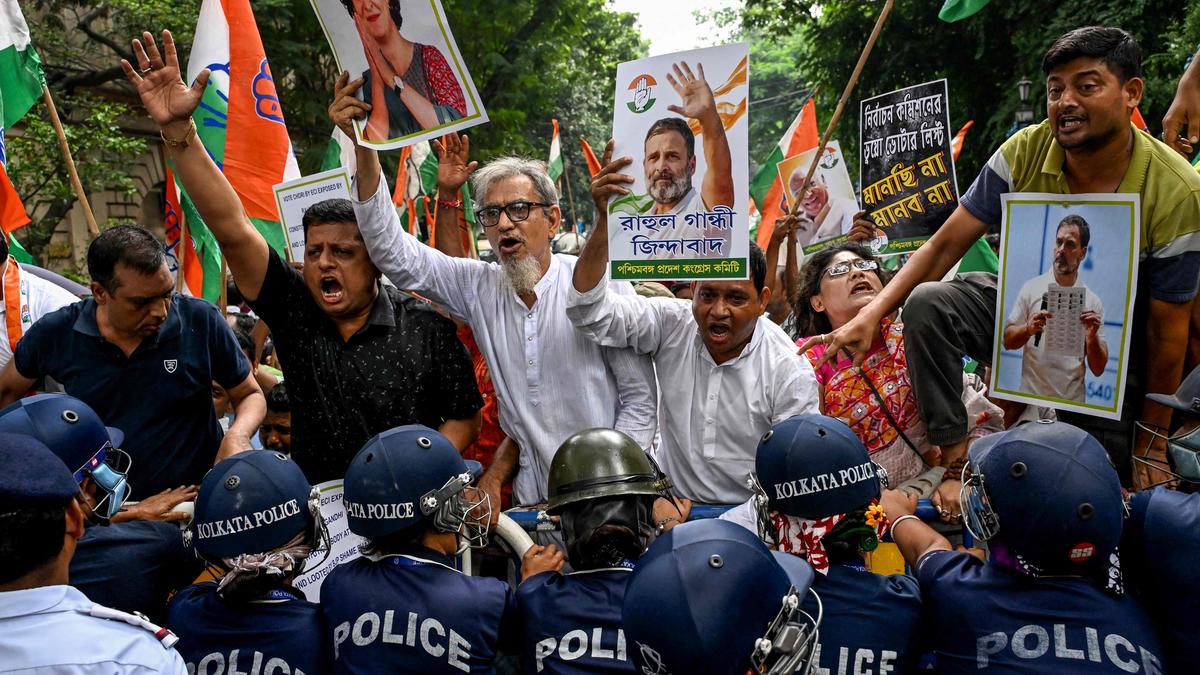
Congress activists during a protest in Kolkata on August 12 to condemn alleged electoral malpractices and the special intensive revision of electoral rolls.
| Photo Credit: AFP
The Election Commission’s attempts to strength the credibility of India’s democratic process by means of an extensive revision of the electoral rolls has unfortunately devolved into yet another partisan fight on the political stage. As the EC has embarked on a special intensive revision (SIR) of voter lists beginning in Bihar as the State heads to the polls in a few months, Opposition parties tried to march to the commission’s office in New Delhi on August 11 in protest.
These critics, quick to push back against proposed schemes to enhance the accuracy and credibility of the electoral rolls, are also quick to point to inaccuracies and duplicates within the list and brand it as electoral fraud and “vote chori (theft)”. The Leader of the Opposition in the Lok Sabha, Rahul Gandhi, held a press conference on August 7 to deliver a presentation accusing the EC of voter fraud in Karnataka in the 2024 Lok Sabha election. Similar allegations have been made with respect to the Maharashtra Assembly election also.
The EC is constitutionally empowered to conduct free and fair elections. This is no easy task to administer in the largest democracy in the world with nearly one billion eligible voters.
India’s electoral process has been reformed and improved drastically since its first elections in 1951-52. Further reforms are no doubt necessary in bolstering electoral integrity. As the EC itself announced, a number of factors make intensive revision of electoral rolls necessary, including India’s frequent inter- and intra-State migration, new voters, and the non-reporting of deaths. But to attack both the commission’s past performance and its future proposals for reform as a means of scoring political points is deeply unhelpful, adding only to toxic political noise.
Aadhaar link
The EC’s plans to strengthen India’s electoral systems, including revising the rolls and linking Aadhaar to the elector photo ID card (EPIC), are neither new nor politically motivated. For over a decade, the commission has consistently advocated for electronic identification systems as a tool to eliminate two of the most persistent challenges facing the country’s electoral process: duplicate entries and voter impersonation.
As early as 2015, the EC launched the National Electoral Rolls Purification and Authentication Programme (NERPAP) to identify and remove duplicate entries. Linking EPIC and Aadhaar was part of this technical approach. Over four years, the EC repeatedly submitted technical and legal proposals to government advocating for biometric authentication to improve roll accuracy. The EC’s announcement in March this year that it had set the ball rolling for linking Aadhaar with EPIC, therefore, has deep roots.
“One citizen, one vote” is the foundation of India’s democracy. The Aadhaar-EPIC linkage will be key in protecting this, from removing duplicate voters to preventing impersonation on polling day. But individual data privacy is a concern. The EC and the Unique Identification Authority of India (UIDAI) must act to ensure protection of personal data, safeguarding the secure management and protection of Aadhaar-linked voter data.
The protests of August 11 reveal fundamental inconsistencies in the Opposition’s positioning. Parties simultaneously highlight alleged instances of voter fraud in Karnataka, while opposing measures being rolled out in Bihar that could address documented vulnerabilities. This approach serves neither democratic integrity nor voter interests.
These critical voices should, in fact, be applauding the efforts of the EC and its SIR of voter lists. The “evidence” of 2024 electoral fraud as posited by Opposition figures — from duplicate names to multiple voters in single addresses and invalid addresses — will be weeded out by this process. The Aadhaar-EPIC linkage will further cement the accuracy and credibility of the voter rolls.
Bipartisan interest
Electoral integrity transcends partisan interests. When documented vulnerabilities persist while potentially comprehensive solutions face resistance that is driven by petty politics, democracy suffers.
The continuation of India’s long tradition of free and fair elections is dependent on an accurate electoral roll — something that requires constant and intensive revision, and which can only be administered by the EC. It will not be an easy task. All parties, regardless of politics, have a duty to work collaboratively to find technically sound solutions that safeguard both the rights of citizens and Indian democracy. For a challenge such as this, serious debate is needed, not political posturing.
Ritesh Pandey belongs to the BJP and is a former MP for Ambedkar Nagar in Uttar Pradesh; views expressed are personal
Published – August 13, 2025 12:20 am IST
